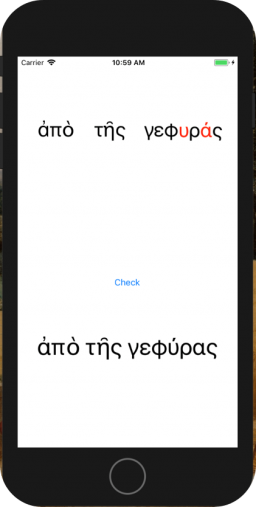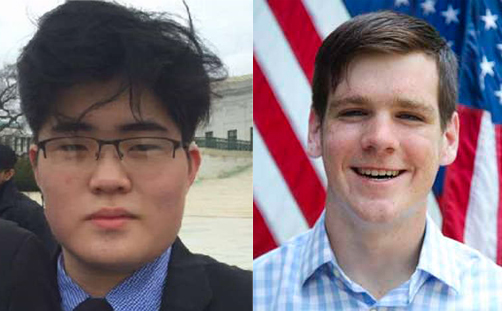The Making of a Greek Language App: Diakritikos
By Nicole Tjin A Djie ’21 Demonstrating a fusion of two languages, a scholar and his students are combining computer code with classical Greek to create a language-learning app that will help Classics students practice accentuation—a key dimension of ancient Greek.
Demonstrating a fusion of two languages, a scholar and his students are combining computer code with classical Greek to create a language-learning app that will help Classics students practice accentuation—a key dimension of ancient Greek.
“Diacritical marks are a general term that we use whether were talking about the Greek language, French, etc…” said Associate Professor of Classics Robert Sobak, explaining the origins of the app’s name.
Diacritical marks are everywhere—appearing above, below, or beside the characters of numerous languages—and are of great significance in the learning process for Greek students.
“In Greek we have used the term since antiquity and that term has been carried over and applied across languages,” said Sobak. “You need them to properly write the word, in essence. Leaving off an accent is akin to leaving off a letter.”
Despite their ubiquity in ancient Greek and importance in capturing the “fullness” of the written language, Sobak himself initially received little direction on diacritical marks in his own early studies of the language. Seeing a need to have his students practice this component of the language, Sobak initiated the development of the app with help from Classics majors Junyoung Hwang ’20 and William Donaldson ’20.
Hwang and Donaldson are laying the ground work for Diakritikos as summer fellows. Hwang, a Gibbons Summer Research fellow, was given the grant to collaborate with a faculty member on a project that uses technology to find creative solutions to problems. Including Hwang, a total of eleven Bowdoin students and eight professors, representing a range of academic disciplines, are working with the Gibbons program to conduct inspired, technology-focused research this summer.

Meanwhile, Donaldson, a Kaufman Family Fellow, also enjoys flexibility with his summer work. As for the Kaufman fellowship, recipients have the chance to pursue a research project of their choice in any discipline.
Together, Hwaang and Donaldson have undertaken the transfer of the ancient language to a digital space—a crucial first step in the app’s creation. The work can be slow, but the two students are motivated by their love of Classics.
“Before I came to Bowdoin I took Latin in high school for four years. Greek was an opportunity that presented itself to me at Bowdoin. It was something I was unable to have in high school, but that I was always interested in,” said Hwang, a rising second-year Greek and mathematics major, “I can’t say I regret taking it even though it is at 8:30 in the morning, every other day.”
Though one can argue that ancient Greek is the hardest language offered at Bowdoin, Donaldson, like Hwang, has found the challenge rewarding.
“I started Greek here as a way of doing the Classics major because I enjoyed the history part of it. And then I ended up really enjoying it,” said Donaldson, who is also minoring in computer science. “I thought it taught me a lot about the English, about writing. It’s interesting, and it’s challenging to work with Greek text. It’s exciting.”
For the rest of the summer Donaldson and Hwang will put in forty hours each a week into the project—as they have been all summer. Even at this pace, the final version of the app will not be ready for some time, Sobak estimates 2020. In the meantime the app’s development is a learning opportunity for Donaldson and Hwang. Referring to the fellows’ competence in the language, Sobak displays his confidence in the fellows to handle the task long-term.
“They’re in that stage where they have learned some, but not so advanced where they’ve forgotten difficult things. So they are in that sweet spot where they are struggling with certain things so they are the perfect designers for this,” he said.